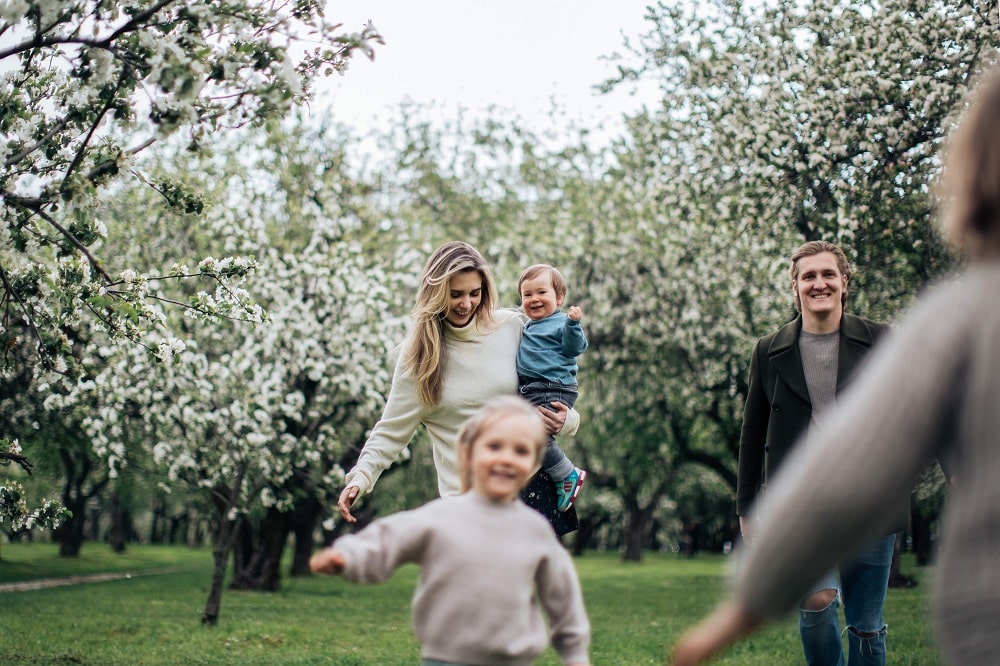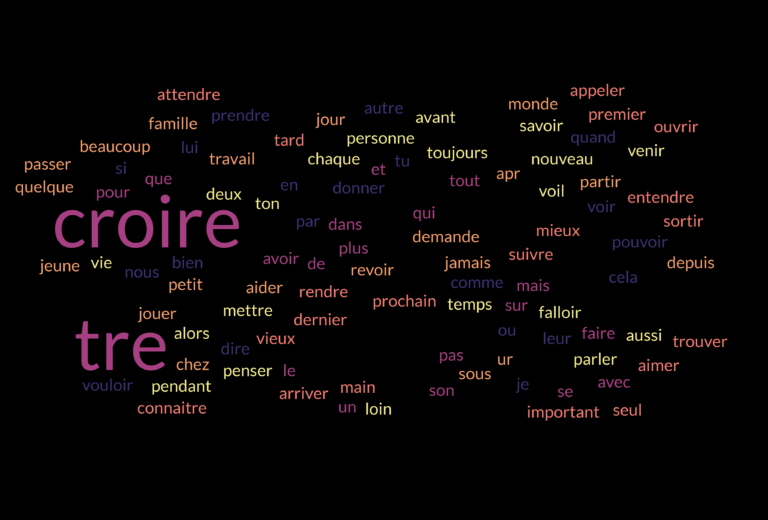Contents
- 1. Most Essential French Words for Any Conversation
- 2. Common -ER, -IR and -RE French Verbs
- 3. Common French Words for Asking Questions
- 4. French Words for People
- 5. French Words for Professions
- 6. Food and Drinks in French
- 7. Parts of the House and Furniture in French
- 8. Modes of Transport in French
- 9. Places in French
- 10. Common French Adjectives
- 11. Animals and Nature Vocabulary in French
- Basic French Grammar
150 Common French Words You Should Learn

Learning vocabulary is one of the cornerstones of learning French. By knowing the most common vocabulary, you’ll get better at everyday communication—which gets you closer to interacting with some of the 300 million people who speak French around the world.
We’ll get you started with 150 easy and common French words. You’ll be well on your way to having a solid base in the French language.
Download: This blog post is available as a convenient and portable PDF that you can take anywhere. Click here to get a copy. (Download)
1. Most Essential French Words for Any Conversation
Let’s start with some essential vocabulary that you’ll end up using a lot in French conversations:
- Bonjour ! — Hello / Good morning!
- Bonsoir ! — Good evening!
- Oui — Yes
- Non — No
- Excusez-moi — Excuse me
- Je suis désolé / Je suis désolée — I’m sorry (with an extra e if you’re female)
- S’il vous plaît — Please
- Merci — Thank you
- À bientôt — See you soon
- Au revoir — Goodbye
110+ Everyday French Phrases | FluentU French Blog
Knowing everyday French phrases can get you pretty far. This post will give you over 110 of the most common French phrases that will have you sounding like a native. You…
2. Common -ER, -IR and -RE French Verbs
Aside from the conversational words and phrases above, you’ve also got to know the absolute most common French verbs:
These verbs are irregular, meaning they don’t follow the same rules of usage (or conjugation) that so-called regular verbs do.
Most French verbs are regular, meaning you only have to learn the endings of their group.
In French, there are three groups of so-called regular verbs, denoted by their infinitive (unconjugated) endings: -er verbs, -ir verbs and -re verbs.
Here are the most common verbs in each group:
-ER Verbs
- Parler — to speak
- Aimer — to like
- Demander — to ask
- Étudier — to study
- Regarder — to watch
- Visiter — to visit (a place)
- Habiter — to live
- Penser — to think
- Manger — to eat
-IR Verbs
- Finir — to finish
- Choisir — to choose
- Grandir — to grow
- Grossir — to gain weight
- Réussir — to succeed / pass (a test)
-RE Verbs
With all these different kinds of verbs, it’s handy to have a verb conjugation tool, like the one from Reverso.
Another option is to study these verbs in action with FluentU, which features authentic French videos with interactive subtitles.
FluentU takes authentic videos—like music videos, movie trailers, news and inspiring talks—and turns them into personalized language learning lessons.
You can try FluentU for free for 2 weeks. Check out the website or download the iOS app or Android app.
P.S. Click here to take advantage of our current sale! (Expires at the end of this month.)
153 Most Common French Verbs for Basic Conversations | FluentU French Blog
Check out the most common French verbs that every beginner should know in this post! We’ll cover present tense conjugations and example sentences for the 50 most common…
3. Common French Words for Asking Questions

Looking for directions? Do you want to know the price of something?
Whatever you do on your trip to France, you’re definitely going to need to ask for help or direction at some point.
Here are some common questions to help you get around:
- Où ? — Where?
- Qui ? — Who?
- Quoi ? — What?
- Quand ? — When?
- Comment ? — How?
- Pourquoi ? — Why?
- Combien ? — How much? / How many?
Of course, the beauty of learning a language is to be able to communicate with native speakers, which means people might also ask you questions!
The Simple Guide to Asking Questions in French | FluentU French Blog
Want to start asking questions in French? We have the answers in this guide! Learn everything you need to know about French question words, how to form questions and where…
4. French Words for People
Want to learn how to describe friends, family members or even strangers? Below you’ll find ten key words for people in French.
- L’homme — the man
- La femme — the woman
- L’enfant — the child
- La fille — the girl
- Le garçon — the boy
- Le bébé — the baby
- La personne — the person
- L’ami / L’amie — the friend (male/female)
- Le collègue / La collègue — the colleague (male/female)
- Le voisin / La voisine — the neighbor (male/female)
5. French Words for Professions

Headed to a French-speaking region for employment? Then the following words are essential!
The following are common words associated with professions:
- Le dentiste — the dentist
- Le médecin — the doctor (medical)
- Le serveur / La serveuse — the waiter / waitress
- L’avocat / L’avocate — the lawyer
- Le caissier / La caissière — the cashier
- L’ingénieur / L’ingénieure — the engineer
- Le plombier / La plombière — the plumber
- Le policier / La policière — the police officer
- L’ouvrier / L’ouvrière — the worker
Jobs in French: A Guide to Common Job Names and More | FluentU French Blog
Do you know how to say common professions in French? Here’s your complete guide to all sort of jobs in French, as well as French job titles—from butchers to diplomats!…
6. Food and Drinks in French
Hungry or thirsty? Check out the most common French words for food and drinks.
- Le restaurant — the restaurant
- Le café — the cafe / coffee
- Le thé — the tea
- Le lait — the milk
- Le vin — the wine
- L’eau — the water
- Le fruit — the fruit
- La pomme — the apple
- L’orange — the orange
- Les légumes — the vegetables
- La carotte — the carrot
- La pomme de terre — the potato
- La tomate — the tomato
- La viande — the meat
- Le poisson — the fish
- Le poulet — the chicken
- Le petit-déjeuner — breakfast
- Le déjeuner — lunch
- Le dîner — dinner
How to Order Food in French Like the Locals Do | FluentU French Blog
Learn how to order in French like a native speaker with this French restaurant vocabulary guide! We’ll walk you through everything you need to know—from meals and food…
7. Parts of the House and Furniture in French
It’s crucial to learn the French words that describe the places where we live.
Check out the following common words that denote specific rooms and spaces in our households.
- La maison — the house
- La pièce — the room
- La cuisine — the kitchen
- La salle à manger — the dining room
- Le salon — the living room
- La chambre — the bedroom
- La salle de bain — the bathroom (may not include a toilet)
- Les toilettes — the bathroom (includes a toilet, sometimes exclusively)
- La porte — the door
- La fenêtre — the window
- L’escalier — the stairs
- Le mur — the wall
- Le sol — the floor
Common words associated with rooms in the house:
- La télévision — the television
- Le canapé / le sofa — the couch
- La chaise — the chair
- La lampe — the lamp
- Le réfrigérateur — the refrigerator
- Le four — the oven
- La table — the table
- Le lit — the bed
- La douche — the shower
- Les toilettes — the toilet (object)
156 French House Vocabulary Words | FluentU French Blog
Want to learn French house vocabulary? Whether you’re a homebody or someone who’s always out, this post has you covered! Here you’ll find 156 French house vocabulary words…
8. Modes of Transport in French
Traveling for leisure or commuting to work? Make sure you learn these words!
- La voiture — the car
- Le bus — the bus
- Le train — the train
- Le métro — the subway
- Le taxi — the taxi
- La moto — the motorcycle
- Le vélo — the bicycle
- L’avion — the airplane
- Le bateau — the boat
- Le navire — the ship
French Transport Vocabulary: 106 Words and Phrases | FluentU French Blog
Need to learn French transport vocabulary? Whether you’re looking to travel by car, bus, plane, train, boat, or even by bike, this post has you covered! Here you’ll find…
9. Places in French

Going somewhere? These French words will help you find what you’re looking for on a map or on Google!
- Le centre-ville — the city center
- Le village — the village
- La campagne — the countryside
- Le quartier — the neighborhood
- Le musée — the museum
- Le parc — the park
- Le marché — the market
- Le magasin — the store
- L’école — the school
- L’université — the university
10. Common French Adjectives
The following are common words that can be used to describe yourself, others or inanimate things.
- Grand / Grande — big
- Petit / Petite — small
- Intelligent / Intelligente — smart
- Fâché / Fâchée — angry
- Triste — sad
- Heureux / Heureuse — happy
- Drôle — funny
- Jeune — young
- Vieux / Vieille — old
- Nerveux / Nerveuse — nervous
- Beau / Belle — beautiful
- Facile — easy
- Difficile — hard
- Fort / Forte — strong
Keep in mind that some adjectives change genders depending on the gender of the noun it describes.
In this list, the masculine forms are given first, with the feminine forms being either those with an added -e or the second form of the adjective.
Interested in more adjectives? Check out how to say common colors in French as well!
173 Essential French Adjectives | FluentU French Blog
Learn important French adjectives with this comprehensive list! It covers 173 adjectives for describing objects, emotions, appearance and more. Each adjective comes with…
11. Animals and Nature Vocabulary in French

The following are common French words that can be used to describe animals or nature.
- Le chien — the dog
- Le chat — the cat
- Le lapin — the rabbit
- Le cheval — the horse
- L’oiseau — the bird
- Le soleil — the sun
- La pluie — the rain
- Le vent — the wind
- La neige — the snow
- Le nuage — the cloud
- La montagne — the mountain
- La plage — the beach
- L’océan — the ocean
- La météo — the weather forecast
- Quel temps fait-il ? — What’s the weather?
- Il fait chaud / Il fait froid — It’s hot/It’s cold
100+ Animals in French: Pets, Farm Animals and More | FluentU French Blog
Get ready to learn animals in French! We’ve got over a hundred French animal terms, plus usage tips, a note on gender and practice resources. From pets to sea animals to…
Basic French Grammar
Now that you’ve seen 150 of the most common French words, it’s important to go over basic grammar so you can start incorporating these words into your own conversations!
Gender
In the French language, nouns are either masculine or feminine. For example, le vent (the wind) is masculine and la pluie (the rain) is feminine.
Words that begin with a vowel sound or “h” have their article changed to l’.
Conjugation
There are three types of French verb endings: -er, -ir and -re.
When conjugating in the present tense: Take the infinitive form, remove the verb ending to get the stem and add the corresponding conjugation.
For more French verb conjugations in different tenses, check out this post.
Adjective Placement
Adjectives are most often placed after the noun. However, in some cases, they may be placed before.
For example:
Le chien est petit. — The dog is small.
Le petit chien. — The small dog.
Adjectives must agree with the gender (and number) of a noun:
La petite maison. — The small house.
(Using the feminine form of “petit”)
And just like that, you have 150 words to bring your French to the next level. Practice these words often and watch your French comprehension and production vastly improve!
Once you’ve mastered them, check out the 500 most frequently used French words for additional targeted vocabulary study.
Download: This blog post is available as a convenient and portable PDF that you can take anywhere. Click here to get a copy. (Download)















